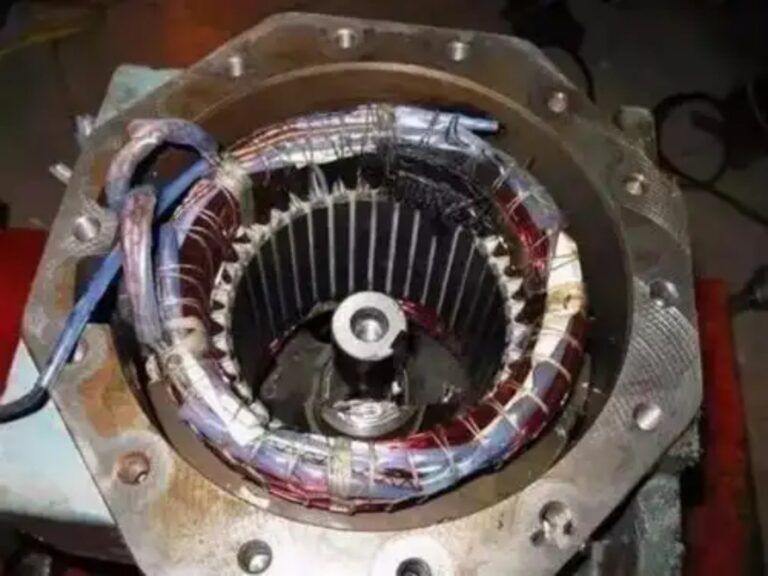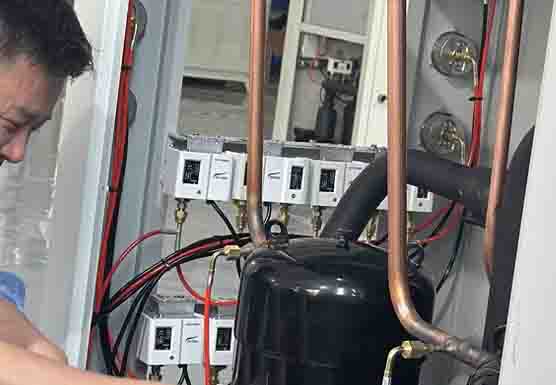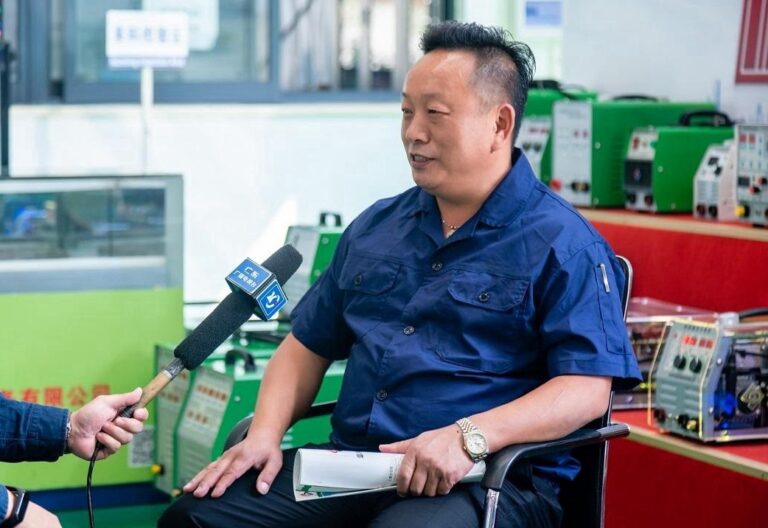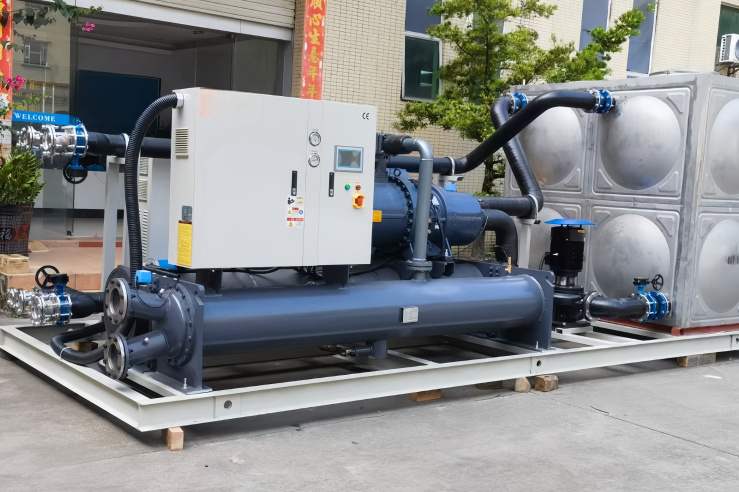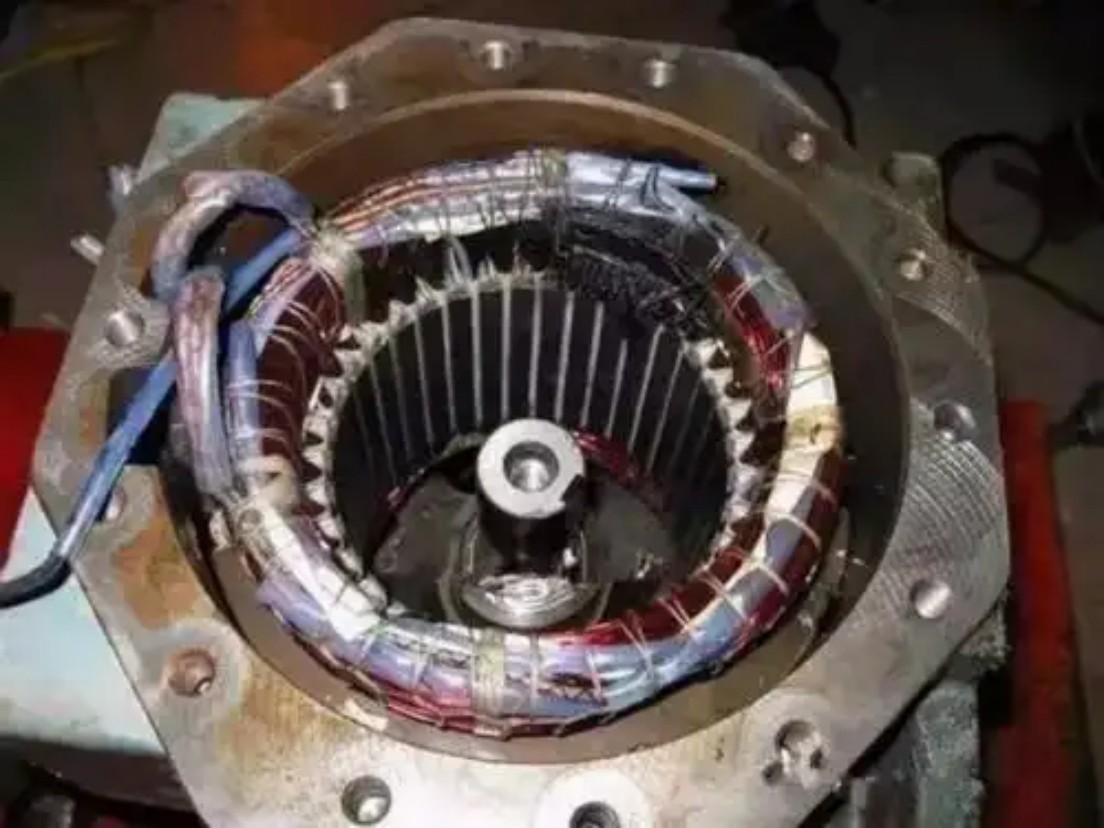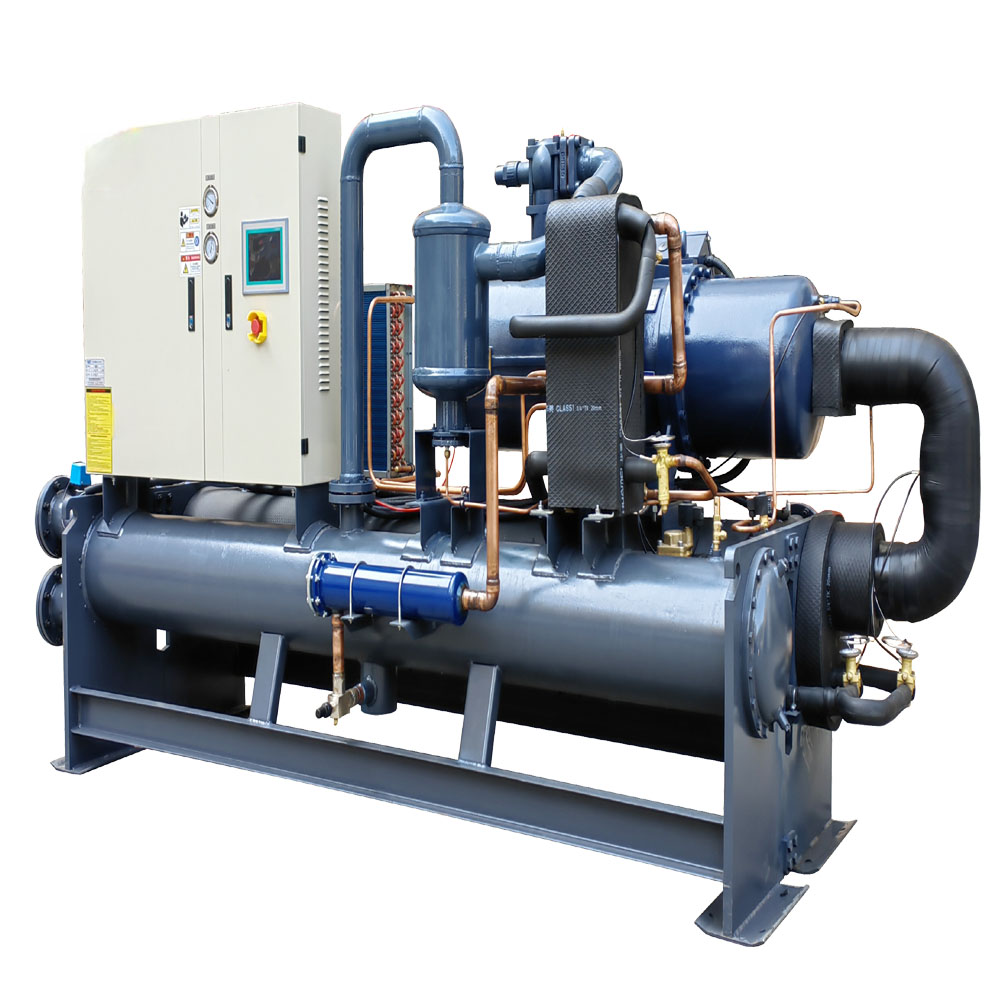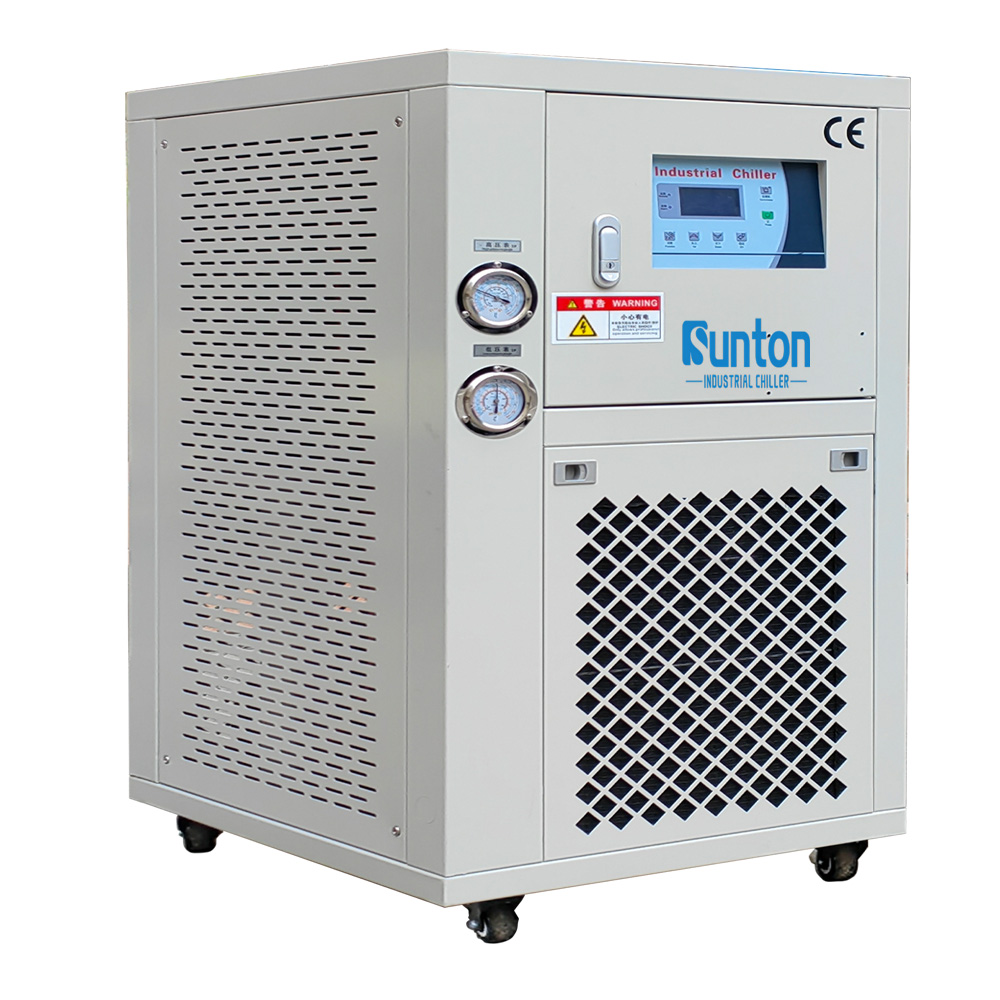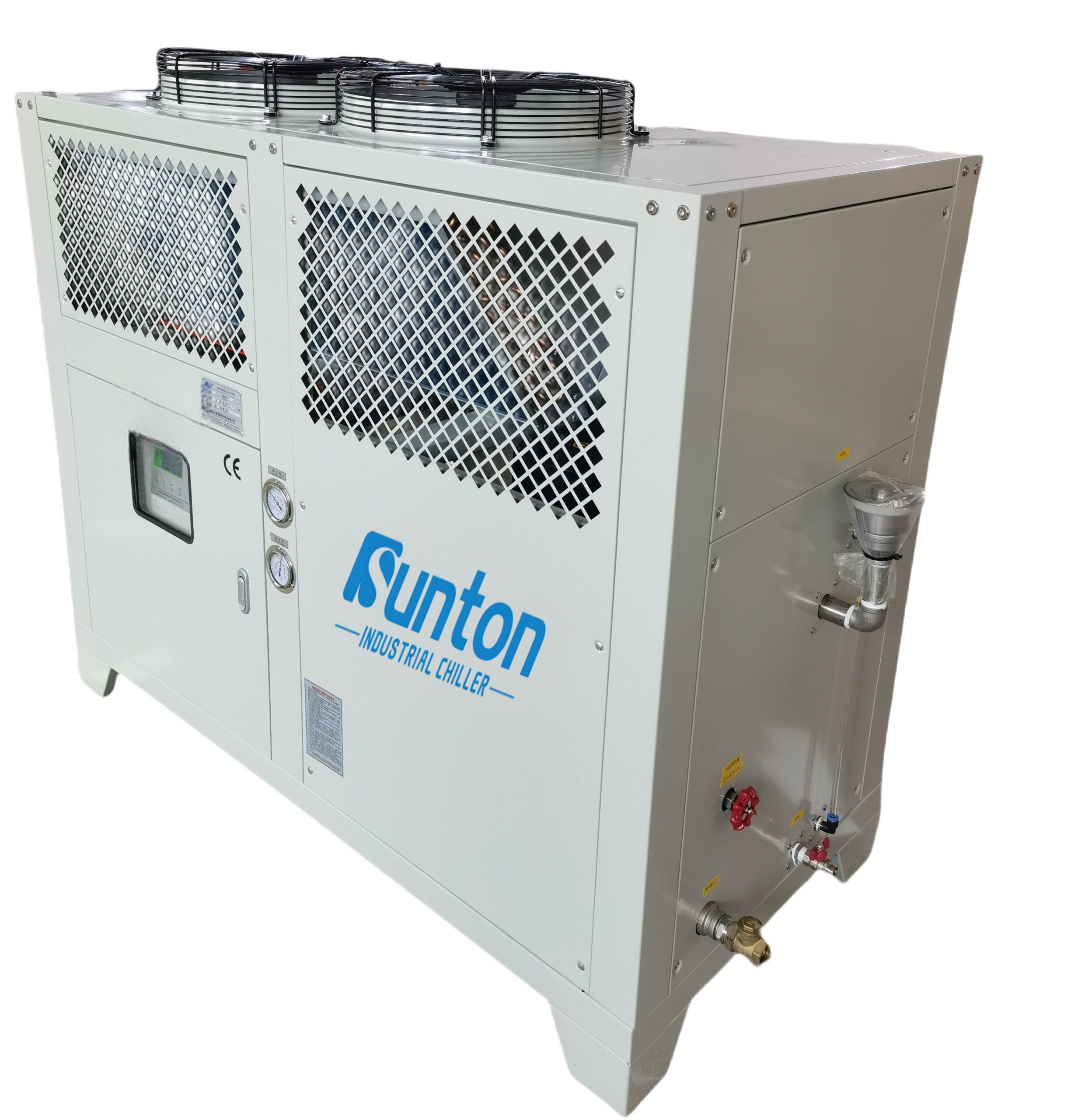-
อุตสาหกรรม Dalingshan กวางตุ้ง
เครื่องทำความเย็นอุตสาหกรรมสำหรับพลาสติก
เครื่องทำความเย็นพลาสติกประสิทธิภาพสูงสำหรับอุตสาหกรรมพลาสติก
เครื่องทำความเย็นพลาสติก, หรือเรียกอีกอย่างว่า เครื่องทำความเย็นสำหรับพลาสติกมักจะทำความเย็นโดยใช้น้ำเย็นเพื่อให้ได้คุณสมบัติตามต้องการ, เป็นสิ่งจำเป็นสำหรับการรักษาอุณหภูมิให้แม่นยำในหลากหลาย กระบวนการพลาสติกคู่มือนี้จะสำรวจบทบาทสำคัญของ เครื่องทำความเย็น ใน อุตสาหกรรมพลาสติกประเภทต่างๆ ที่มีจำหน่าย และวิธีการเลือกระบบที่เหมาะสมกับความต้องการเฉพาะของคุณ ไม่ว่าคุณจะเกี่ยวข้องกับการฉีดขึ้นรูปหรือการอัดขึ้นรูปพลาสติก การควบคุมอุณหภูมิถือเป็นสิ่งสำคัญ การปั้นการอัดรีดหรืออื่น ๆ พลาสติก แอพพลิเคชั่นข้อมูลเหล่านี้จะช่วยคุณเพิ่มประสิทธิภาพการใช้งานของคุณ ระบบทำความเย็นเพื่อเพิ่มคุณภาพผลิตภัณฑ์และเพิ่มประสิทธิภาพโดยรวม เครื่องทำความเย็นพลาสติก โรงงานผลิต เราเข้าใจความต้องการระบายความร้อนที่เป็นเอกลักษณ์ของอุตสาหกรรมพลาสติกและนำเสนอโซลูชันที่มีคุณภาพสูงและเชื่อถือได้หลากหลายที่เหมาะกับความต้องการเฉพาะของคุณ
เพิ่มประสิทธิภาพด้วยเครื่องทำความเย็นอุตสาหกรรมของเรา
ของเรา เครื่องทำความเย็นพลาสติก เสนอให้แม่นยำ การควบคุมอุณหภูมิประสิทธิภาพการใช้พลังงาน และการทำงานที่เชื่อถือได้ ซึ่งจำเป็นสำหรับการเพิ่มประสิทธิภาพของคุณ กระบวนการพลาสติก. เราให้บริการที่กำหนดเอง โซลูชั่นการทำความเย็น เพื่อตอบสนองความต้องการที่หลากหลายของ อุตสาหกรรมแปรรูปพลาสติกการเป็นพันธมิตรกับเราหมายถึงการเข้าถึงคำแนะนำจากผู้เชี่ยวชาญ การออกแบบที่กำหนดเอง ผลิตภัณฑ์คุณภาพสูง และการสนับสนุนหลังการขายที่ครอบคลุม เรามีเครื่องทำความเย็นหลากหลายประเภท รวมถึง เครื่องทำน้ำเย็นแบบสโครลระบายความร้อนด้วยน้ำ, เครื่องทำความเย็นแบบสกรูระบายความร้อนด้วยอากาศ, และ เครื่องทำน้ำเย็นแบบสกรูระบายความร้อนด้วยน้ำแต่ละอันได้รับการออกแบบมาเพื่อประสิทธิภาพและประสิทธิภาพสูงสุดในการใช้งานอุตสาหกรรมที่ต้องการประสิทธิภาพสูง ติดต่อเราได้วันนี้เพื่อหารือเกี่ยวกับความต้องการเฉพาะของคุณและให้เราช่วยคุณเลือกสิ่งที่ดีที่สุด เครื่องทำความเย็น สำหรับการดำเนินงานของคุณ
<br>
การควบคุมอุณหภูมิที่แม่นยำเพื่อกระบวนการพลาสติกที่เหมาะสมที่สุดด้วยเครื่องทำความเย็นกระบวนการของเรา
ของเรา เครื่องทำความเย็นกระบวนการ ได้รับการออกแบบมาเพื่อส่งมอบความแม่นยำ การควบคุมอุณหภูมิปัจจัยสำคัญในการรักษาคุณภาพและความสม่ำเสมอของคุณ ผลิตภัณฑ์พลาสติก. เราเสนอผลิตภัณฑ์หลากหลาย ความสามารถในการทำความเย็น ตัวเลือกเพื่อให้ตรงกับความต้องการเฉพาะของกระบวนการของคุณ เครื่องทำความเย็นจะจ่ายน้ำเย็นอย่างสม่ำเสมอเพื่อการทำความเย็นที่มีประสิทธิภาพ เครื่องทำความเย็น มีความจำเป็นสำหรับการควบคุมอุณหภูมิในการใช้งาน เช่น การฉีดขึ้นรูปการอัดรีดและการเป่า การปั้นการควบคุมอุณหภูมิที่สม่ำเสมอทำให้ผลิตภัณฑ์มีคุณภาพดีขึ้น เวลาในการทำงานเร็วขึ้น และลดของเสีย ส่งผลให้ภาพรวมของคุณดีขึ้น กระบวนการผลิตพลาสติก. แม่นยำ การควบคุมอุณหภูมิ ป้องกันการบิดงอ หดตัว และข้อบกพร่องอื่นๆ ที่อาจเกิดขึ้นระหว่างการทำความเย็น ช่วยให้มั่นใจได้ว่าผลิตภัณฑ์ของคุณตรงตามมาตรฐานคุณภาพสูงสุด
วงจรทำความเย็นขั้นสูงเพื่อการทำความเย็นที่เชื่อถือได้สำหรับกระบวนการพลาสติกของคุณ
ของเรา เครื่องทำความเย็น ใช้ขั้นสูง การทำความเย็น วงจรที่ออกแบบมาเพื่อความน่าเชื่อถือและประสิทธิภาพ วงจรทำความเย็น รวมถึง คอมเพรสเซอร์, คอนเดนเซอร์, และ เครื่องทำความเย็นส่วนกลางมักใช้ในกระบวนการทางอุตสาหกรรมเพื่อรักษาอุณหภูมิที่เหมาะสมที่สุด, ร่วมกันทำงานเพื่อหมุนเวียน สารทำความเย็น และขจัดความร้อนออกจากตัวคุณ กระบวนการพลาสติก. การ คอมเพรสเซอร์ เดอะ สารทำความเย็นทำให้อุณหภูมิและความดันสูงขึ้น สารทำความเย็นที่มีอุณหภูมิสูงจะไหลไปที่ คอนเดนเซอร์โดยจะปล่อยความร้อนไปยังตัวกลางทำความเย็น เช่น อากาศหรือน้ำ จากนั้นสารทำความเย็นจะผ่านเข้าไป วาล์วขยายตัวในเครื่องทำความเย็นทำหน้าที่ควบคุมการไหลของสารทำความเย็นได้อย่างแม่นยำโดยลดความดันและอุณหภูมิลงก่อนเข้า เครื่องระเหย. ในเครื่องระเหย สารทำความเย็นเย็นจะดูดซับ ความร้อนจากพลาสติกทำความเย็นอย่างมีประสิทธิภาพ ระบบวงจรปิดนี้ช่วยให้ทำความเย็นได้สม่ำเสมอและเชื่อถือได้ ซึ่งเป็นสิ่งสำคัญสำหรับการรักษาความสมบูรณ์และคุณภาพของผลิตภัณฑ์พลาสติกของคุณ เราให้ความสำคัญกับ คุณภาพและความน่าเชื่อถือ ส่วนประกอบของเราเพื่อให้มั่นใจถึงประสิทธิภาพที่ยาวนานและลดระยะเวลาหยุดทำงานให้เหลือน้อยที่สุด การเลือก เครื่องทำความเย็น การใช้สารทำความเย็นชนิดที่ถูกต้องสำหรับการใช้งานเฉพาะของคุณถือเป็นสิ่งสำคัญในการเพิ่มประสิทธิภาพการทำงาน เครื่องทำความเย็นของเราสามารถใช้สารทำความเย็นชนิดต่างๆ เพื่อให้เหมาะกับความต้องการของคุณได้ดีที่สุด
ข้อมูลจำเพาะทางเทคนิค
| ข้อมูลจำเพาะ | ช่วง/ตัวเลือก |
| ความสามารถในการทำความเย็น | 5 – 500 ตัน |
| สารทำความเย็น | R-134a, R-410A และทางเลือกที่เป็นมิตรต่อสิ่งแวดล้อมอื่นๆ |
| ประเภทคอมเพรสเซอร์ | เลื่อน หมุน หมุน หมุน |
| ประเภทคอนเดนเซอร์ | ระบายความร้อนด้วยอากาศ, ระบายความร้อนด้วยน้ำ |
| แหล่งจ่ายไฟ | ปรับแต่งได้ |
| การควบคุมอุณหภูมิ | ดิจิตอล, ตั้งโปรแกรมได้ |
คำแนะนำการใช้งานสำหรับหน่วยควบคุมถือเป็นสิ่งสำคัญสำหรับการทำงานที่เหมาะสมที่สุด ศึกษาคู่มือผู้ใช้เครื่องทำความเย็นแต่ละรุ่นสำหรับคำแนะนำการใช้งานและการบำรุงรักษาโดยละเอียด
ผลกระทบต่อสิ่งแวดล้อม: เครื่องทำความเย็นของเราได้รับการออกแบบมาโดยคำนึงถึงสิ่งแวดล้อม เราเสนอ สารทำความเย็น ตัวเลือกที่มีศักยภาพในการทำให้โลกร้อน (GWP) ต่ำและปรับให้การออกแบบเพื่อประสิทธิภาพการใช้พลังงานเหมาะสมที่สุด
ความคิดเห็นของลูกค้า:
“ตั้งแต่การติดตั้งของคุณ เครื่องทำความเย็นด้วยน้ำรอบเวลาในการฉีดขึ้นรูปของเราลดลงอย่างมาก และคุณภาพของผลิตภัณฑ์ก็ดีขึ้นอย่างมาก ประสิทธิภาพของเครื่องทำความเย็นยังช่วยลดต้นทุนด้านพลังงานของเราอีกด้วย” – ผู้จัดการโรงงาน โรงงานผลิตพลาสติก
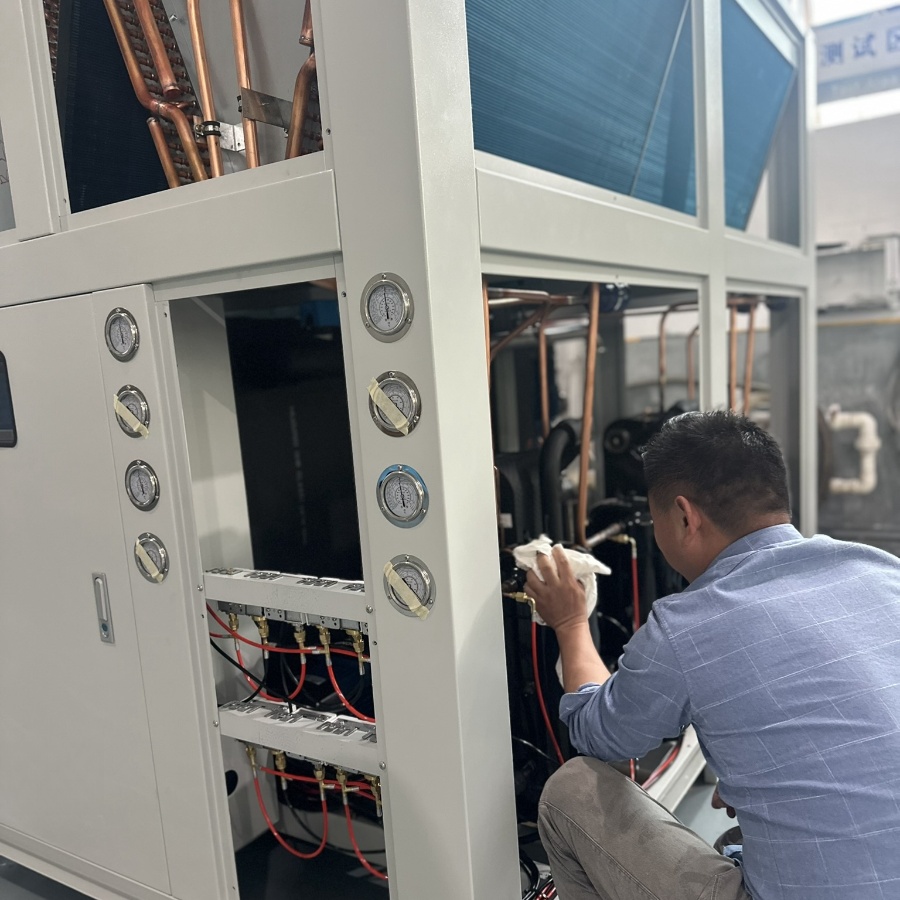
สรุปข้อดี:
เพิ่มประสิทธิภาพของคุณ พลาสติก การผลิตด้วยเครื่องทำความเย็นที่มีประสิทธิภาพของเรา! การควบคุมอุณหภูมิที่แม่นยำช่วยให้มั่นใจได้ว่าผลิตภัณฑ์มีคุณภาพสูงสุดในขณะที่ประหยัดพลังงาน ติดต่อเราสำหรับโซลูชันการทำความเย็นแบบกำหนดเอง
เครื่องทำความเย็นสำหรับการแปรรูปพลาสติก: การเจาะลึกระบบทำความเย็นกระบวนการ
คู่มือนี้จะสำรวจบทบาทสำคัญของ เครื่องทำความเย็นสำหรับการแปรรูปพลาสติกโดยให้ข้อมูลเชิงลึกเกี่ยวกับวิธีการทำงาน ประเภทต่างๆ และปัจจัยสำคัญที่ต้องพิจารณาเมื่อเลือกใช้ระบบที่เหมาะสม ไม่ว่าคุณจะเกี่ยวข้องกับการฉีด การปั้น, การอัดรีดหรืออื่น ๆ กระบวนการพลาสติกการเข้าใจการระบายความร้อนเป็นสิ่งสำคัญสำหรับการผลิตผลิตภัณฑ์คุณภาพสูง ผลิตภัณฑ์พลาสติก. เราจะเจาะลึกถึงความซับซ้อนของ กระบวนการทำความเย็น, การสำรวจความแตกต่าง ประเภทของเครื่องทำความเย็น ระบบ คุณสมบัติหลัก และเคล็ดลับการบำรุงรักษาเพื่อให้แน่ใจว่า ระบบทำความเย็น กำลังทำงานได้อย่างราบรื่น
เครื่องทำความเย็นคืออะไร และเหตุใดการทำความเย็นจึงมีความสำคัญต่ออุตสาหกรรมพลาสติก
เอ เครื่องทำความเย็น เป็น การทำความเย็น เครื่องที่ ดับความร้อน จาก น้ำสำหรับกระบวนการ วนซ้ำและถ่ายโอนไปยังตัวกลางอื่น เช่น อากาศหรือ น้ำเพื่ออุตสาหกรรม. การระบายความร้อนเป็นสิ่งสำคัญ ใน อุตสาหกรรมพลาสติก เนื่องจากมันส่งผลโดยตรงต่อคุณภาพของผลิตภัณฑ์ เวลาในรอบการทำงาน และการใช้งานระบบระบายความร้อนโดยรวม ประสิทธิภาพการทำงาน. ในกระบวนการเช่น การฉีดขึ้นรูป และ การอัดรีด, แม่นยำ การควบคุมอุณหภูมิ เป็นสิ่งสำคัญสำหรับการบรรลุคุณสมบัติของวัสดุตามต้องการและป้องกันข้อบกพร่อง
ปราศจาก ความเย็นเพียงพอ, เดอะ พลาสติก อาจไม่แข็งตัวอย่างถูกต้อง ส่งผลให้ชิ้นส่วนบิดเบี้ยว ขนาดไม่สม่ำเสมอ และความแข็งแรงเชิงกลลดลง ในทางกลับกัน การทำความเย็นอย่างรวดเร็วและควบคุมได้ด้วยน้ำเย็น ส่งผลให้ผลิตภัณฑ์มีคุณภาพสูงขึ้น เวลาในการทำงานเร็วขึ้น และผลผลิตเพิ่มขึ้น
ประเภทต่างๆ ของเครื่องทำความเย็นสำหรับพลาสติก: เลือกประเภทที่เหมาะสม
หลากหลาย ประเภทของเครื่องทำความเย็น มีให้เลือกใช้ โดยแต่ละแบบมีข้อดีและข้อเสียที่แตกต่างกัน การเข้าใจความแตกต่างเหล่านี้ถือเป็นกุญแจสำคัญในการเลือก เครื่องทำความเย็นสำหรับการแปรรูปพลาสติก.
- เครื่องทำความเย็นแบบอากาศ: สิ่งเหล่านี้ใช้ บรรยากาศ อากาศไป เย็น เดอะ สารทำความเย็นโดยทั่วไปแล้วจะติดตั้งง่ายกว่า แต่มีประสิทธิภาพน้อยกว่าในสภาพอากาศที่ร้อน เครื่องทำน้ำเย็นแบบสโครลระบายความร้อนด้วยอากาศ เหมาะอย่างยิ่งสำหรับพื้นที่แคบ เพื่อประสิทธิภาพสูงสุดในสภาพอากาศที่หลากหลาย ให้มองหา เครื่องทำความเย็นด้วยอากาศ ออกแบบมาเพื่อให้ทำงานได้ดีภายใต้สภาวะอุณหภูมิแวดล้อมทั้งสูงและต่ำ เครื่องทำความเย็น ปรับการทำงานเพื่อรักษาประสิทธิภาพการทำความเย็นที่สม่ำเสมอไม่ว่าอุณหภูมิอากาศโดยรอบจะเป็นเท่าใดก็ตาม
- เครื่องทำความเย็นด้วยน้ำ: สิ่งเหล่านี้ใช้แบบแยก น้ำ ลูปไป เย็น เดอะ สารทำความเย็น, เสนอสิ่งที่มากกว่า ประสิทธิภาพการใช้พลังงานโดยเฉพาะในสภาพแวดล้อมที่อบอุ่น พวกมันต้องการ หอหล่อเย็น หรือแหล่งน้ำอื่น เครื่องทำความเย็นด้วยน้ำ มีประสิทธิภาพมากขึ้นเนื่องจากความสามารถในการถ่ายเทความร้อนที่เหนือกว่าของน้ำ
- เครื่องทำความเย็นแบบพกพา: เครื่องทำความเย็นแบบพกพา ให้ความยืดหยุ่น ช่วยให้คุณสามารถเคลื่อนย้ายและเชื่อมต่อกับอุปกรณ์ต่างๆ ได้อย่างรวดเร็วตามต้องการ เหมาะกับการใช้งานขนาดเล็กหรือชั่วคราว การทำให้เย็นลง ความต้องการ พิจารณาให้มันเป็นเครื่องทำความเย็นแบบพกพาที่คุณสามารถย้ายและนำไปใช้งานได้อย่างง่ายดาย
สำหรับความต้องการทางอุตสาหกรรมเฉพาะ เช่น สภาพแวดล้อมที่เป็นอันตราย ให้สำรวจเฉพาะทาง เครื่องทำความเย็นป้องกันการระเบิดทางเลือกที่ดีที่สุดขึ้นอยู่กับการใช้งานเฉพาะ งบประมาณ และสภาพแวดล้อมของคุณ
เครื่องทำความเย็นทำงานอย่างไร ทำความเข้าใจวงจรทำความเย็น
ความเข้าใจเกี่ยวกับวิธีการ งานเครื่องทำความเย็นs เกี่ยวข้องกับการเข้าใจพื้นฐานของ วงจรทำความเย็น. ก. เครื่องทำความเย็น ใช้ของเหลวชนิดพิเศษที่เรียกว่า สารทำความเย็น ที่ดูดซับและปล่อยความร้อนอย่างต่อเนื่อง วงจรทำความเย็น เป็นหัวใจของ เครื่องทำความเย็น, การทำหน้าที่สำคัญในการ การทำให้เย็นลง กระบวนการ น้ำซึ่งต่อมาได้นำมาใช้ในการควบคุมอุณหภูมิ พลาสติก อุปกรณ์และวัสดุในการประมวลผล ต่อไปนี้คือคำอธิบายแบบง่าย ๆ:
- การบีบอัด: การ คอมเพรสเซอร์ เดอะ สารทำความเย็น,ทำให้อุณหภูมิและแรงดันเพิ่มขึ้น
- การควบแน่น: อากาศร้อน แรงดันสูง สารทำความเย็น ไหลไปที่ คอนเดนเซอร์ซึ่งจะปล่อยความร้อนออกไปในอากาศระบายความร้อนด้วยอากาศ) หรือ น้ำ (ระบายความร้อนด้วยน้ำ) และเปลี่ยนจากก๊าซไปเป็นของเหลว
- การขยายตัว: สารทำความเย็นเหลวจะผ่าน วาล์วขยายตัวโดยทำให้ความดันและอุณหภูมิลดลง
- การระเหย: ความหนาวเย็น, แรงดันต่ำ สารทำความเย็น ไหลไปที่ เครื่องระเหยที่มันดูดซับ ความร้อนจากพลาสติก กระบวนการ น้ำ. การ สารทำความเย็น กลับสู่สถานะก๊าซ พร้อมที่จะถูกบีบอัดอีกครั้ง ทำซ้ำวงจรเดิม ความร้อนที่ดูดซับระหว่างการระเหยเป็นกลไกที่คุณ พลาสติก สินค้าหรืออุปกรณ์ต่างๆได้รับการระบายความร้อน
การเพิ่มประสิทธิภาพการฉีดขึ้นรูปด้วยเครื่องทำความเย็น: การควบคุมอุณหภูมิที่แม่นยำ
เครื่องทำความเย็น มีความสำคัญในการฉีดขึ้นรูปเพื่อรักษาความสม่ำเสมอ อุณหภูมิและความดัน ภายในแม่พิมพ์ ทำให้ได้ชิ้นส่วนคุณภาพสูงที่ผลิตด้วยน้ำเย็น ช่วยจัดการการทำงานที่รวดเร็ว การทำความร้อนและความเย็น วัฏจักรที่เป็นธรรมชาติใน การฉีดขึ้นรูป กระบวนการ.
ควบคุมอุณหภูมิได้อย่างแม่นยำ ภายใน แม่พิมพ์ มีความจำเป็นสำหรับการควบคุมอัตราการเย็นตัวของพลาสติกหลอมเหลวในการใช้งานทำความเย็น พลาสติกการทำความเย็นแบบควบคุมนี้ช่วยให้ผู้ผลิตสามารถบรรลุคุณสมบัติของวัสดุที่ต้องการและปรับเวลาการทำงานให้เหมาะสมได้ หากไม่ได้รับการควบคุมอย่างเหมาะสม การทำให้เย็นลง, เดอะ พลาสติก อาจเย็นตัวไม่สม่ำเสมอ ทำให้เกิดการบิดงอ หดตัว หรือข้อบกพร่องอื่นๆ การทำให้เย็นลง และยังช่วยลดระยะเวลาในการทำความเย็น ทำให้ผลิตได้เร็วขึ้น
การปรับปรุงกระบวนการอัดรีดด้วยเครื่องทำความเย็น
ใน การอัดรีด, เครื่องทำความเย็น มีบทบาทสำคัญในการรักษาอุณหภูมิที่เหมาะสมของกระบอกและแม่พิมพ์ของเครื่องอัดรีด โดยรับประกันความสม่ำเสมอ การทำให้เย็นลง, ช่วยในการผลิตให้มีความสม่ำเสมอ ผลิตภัณฑ์พลาสติก.
การอัดรีด เป็นกระบวนการต่อเนื่องที่ พลาสติก จะถูกหลอมและบังคับให้ผ่านแม่พิมพ์เพื่อสร้างรูปร่างเฉพาะ อุณหภูมิที่สม่ำเสมอเป็นสิ่งสำคัญสำหรับการรักษาความหนืดและอัตราการไหลของของเหลวที่หลอมละลายให้สม่ำเสมอ พลาสติกหากไม่มีการระบายความร้อนที่เหมาะสม การเปลี่ยนแปลงอุณหภูมิอาจส่งผลให้ผลิตภัณฑ์ที่อัดออกมาไม่สม่ำเสมอ ส่งผลกระทบต่อขนาดและความแข็งแรง เครื่องทำความเย็น เพื่อให้แน่ใจว่ากระบวนการอัดรีดดำเนินไปอย่างราบรื่น ผลิตสินค้าคุณภาพสูงและสม่ำเสมอ พลาสติก สินค้า.
การเลือกเครื่องทำความเย็นพลาสติกที่เหมาะสม: ปัจจัยที่ต้องพิจารณา
การเลือกใช้ เครื่องทำความเย็นพลาสติกด้านขวา ต้องพิจารณาปัจจัยหลายประการอย่างรอบคอบ ซึ่งรวมถึงการคำนึงถึงประเภทของ พลาสติก ถูกใช้เฉพาะเจาะจง กระบวนการพลาสติก, ที่จำเป็น การควบคุมอุณหภูมิ ระดับและภาพรวม ความสามารถในการทำความเย็น จำเป็น ต่อไปนี้คือปัจจัยสำคัญบางประการที่ต้องพิจารณา:
- ความสามารถในการทำความเย็น: กำหนดความสามารถในการทำความเย็นที่ต้องการเป็นตันหรือ BTU ตามข้อมูลจำเพาะของคุณ ข้อกำหนดในการทำความเย็นการคำนวณที่ไม่แม่นยำอาจนำไปสู่การทำความเย็นที่ไม่มีประสิทธิภาพหรือพลังงานในการทำความเย็นไม่เพียงพอต่อความต้องการของคุณ
- ประเภทของเครื่องทำความเย็น : เลือกระหว่างเครื่องทำความเย็นแบบระบายความร้อนด้วยอากาศหรือแบบระบายความร้อนด้วยน้ำตามทรัพยากรที่มีอยู่ สภาพแวดล้อม และต้นทุนในระยะยาว เครื่องทำความเย็นแบบระบายความร้อนด้วยน้ำมักมีประสิทธิภาพดีกว่าแต่ต้องติดตั้งและบำรุงรักษาที่ซับซ้อนกว่า
- ความแม่นยำในการควบคุมอุณหภูมิ: กระบวนการที่แตกต่างกันต้องการความแม่นยำในระดับที่แตกต่างกัน เลือก เครื่องทำความเย็น ที่ให้ความเสถียรของอุณหภูมิที่แม่นยำตามความต้องการของการใช้งานของคุณ
- ประสิทธิภาพการใช้พลังงาน: มองหาเครื่องทำความเย็นที่มีประสิทธิภาพการใช้พลังงานสูงเพื่อลดต้นทุนการดำเนินงาน
- ข้อกำหนดการบำรุงรักษา: พิจารณาความต้องการบำรุงรักษาเครื่องทำความเย็น และเลือกเครื่องที่ลดระยะเวลาหยุดทำงานให้น้อยที่สุด
เครื่องทำความเย็นพลาสติกแบบพกพา: โซลูชันการทำความเย็นที่ยืดหยุ่นสำหรับการดำเนินงานขนาดเล็ก
เครื่องทำความเย็นพลาสติกแบบพกพา เสนอวิธีการที่ยืดหยุ่นและมีประสิทธิภาพในการ เย็น หลากหลาย กระบวนการพลาสติกหน่วยที่กะทัดรัดและเคลื่อนย้ายได้เหล่านี้เหมาะอย่างยิ่งสำหรับการดำเนินการขนาดเล็ก โดยทำหน้าที่ระบายความร้อนเพิ่มเติมหรือระบายความร้อนให้กับเครื่องจักรแต่ละเครื่อง
สิ่งเหล่านี้มีความอเนกประสงค์ เครื่องทำความเย็น เหมาะอย่างยิ่งเมื่อคุณต้องการ เย็น อุปกรณ์ที่แตกต่างกันหรือเมื่อความต้องการในการทำความเย็นของคุณแตกต่างกัน มักจะใช้ร่วมกับเครื่องขึ้นรูปขนาดเล็ก ซึ่งให้โซลูชันที่คุ้มต้นทุนในกรณีที่ไม่จำเป็นต้องใช้เครื่องทำความเย็นส่วนกลางขนาดใหญ่ ความสามารถในการเคลื่อนย้ายได้ทำให้เคลื่อนย้ายได้ง่าย ทำให้ปรับให้เข้ากับความต้องการในการผลิตที่เปลี่ยนแปลงได้
เครื่องทำความเย็นสำหรับกระบวนการพลาสติก: การรับประกันคุณภาพและความน่าเชื่อถือในการผลิตพลาสติก
เครื่องทำความเย็นสำหรับกระบวนการพลาสติก เป็นสิ่งจำเป็นสำหรับการรักษาอุณหภูมิที่สม่ำเสมอในกระบวนการผลิตพลาสติกต่างๆ ระบบระบายความร้อนเฉพาะเหล่านี้ได้รับการออกแบบมาโดยเฉพาะสำหรับความต้องการของ การผลิตพลาสติกเพื่อให้แน่ใจว่าทั้งคุณภาพของผลิตภัณฑ์และเครื่องทำความเย็นมีประสิทธิภาพในการทำงาน โดยจะควบคุมอุณหภูมิได้อย่างแม่นยำ ทำให้ผลิตภัณฑ์มีความสม่ำเสมอเหนือระดับและลดข้อบกพร่องให้เหลือน้อยที่สุด
โดยการลงทุนในสิ่งที่แข็งแกร่งและเชื่อถือได้ เครื่องทำความเย็นสำหรับกระบวนการพลาสติกผู้ผลิตสามารถปรับปรุงคุณภาพผลิตภัณฑ์ ลดเวลาในรอบการทำงาน และเพิ่มประสิทธิภาพกระบวนการผลิตโดยรวม การระบายความร้อนที่สม่ำเสมอช่วยลดความเสี่ยงของข้อบกพร่องที่เกิดจากความผันผวนของอุณหภูมิ ทำให้มั่นใจได้ว่าการผลิตผลิตภัณฑ์ที่มีคุณภาพสูง ผลิตภัณฑ์พลาสติก.
ทำความเข้าใจเกี่ยวกับอุปกรณ์กระบวนการพลาสติกและความต้องการในการทำความเย็นของคุณ
แตกต่าง กระบวนการพลาสติก และอุปกรณ์ต่างๆ มีความต้องการระบายความร้อนที่เป็นเอกลักษณ์ การฉีด การปั้น, การอัดรีด, และ การเป่าขึ้นรูปตัวอย่างเช่น แต่ละระบบต้องใช้วิธีการทำความเย็นที่แตกต่างกัน การทำความเข้าใจความแตกต่างเหล่านี้ถือเป็นสิ่งสำคัญเมื่อเลือกเครื่องทำความเย็น
การฉีดขึ้นรูป ต้องรวดเร็วและแม่นยำ การทำให้เย็นลง ของ แม่พิมพ์ เพื่อรักษาเวลาในรอบการทำงานและป้องกันการบิดเบี้ยว การอัดรีด จำเป็นต้องมีการควบคุมอุณหภูมิที่สม่ำเสมอเพื่อจัดการการไหลและความสม่ำเสมอของของเหลวที่หลอมละลาย พลาสติกการขึ้นรูปด้วยลมต้องอาศัยการระบายความร้อนเพื่อรักษารูปร่างของชิ้นส่วนที่ขึ้นรูป หากต้องการประเมินความต้องการระบายความร้อนของคุณ ให้พิจารณาปัจจัยต่างๆ เช่น ประเภทของพลาสติก เวลาการทำงานที่ต้องการ และสภาพแวดล้อม
การดูแลรักษาระบบน้ำเพื่อประสิทธิภาพการทำงานของเครื่องทำความเย็นที่เหมาะสมที่สุด
การดูแลรักษาความสะอาดและมีประสิทธิภาพ ระบบน้ำ เป็นสิ่งสำคัญสำหรับประสิทธิภาพการทำงานของเครื่องทำความเย็นที่เหมาะสมที่สุด การดูแลรักษาอย่างดี ระบบน้ำ ช่วยเพิ่มประสิทธิภาพการถ่ายเทความร้อน ลดการใช้พลังงาน และยืดอายุการใช้งานของเครื่องทำความเย็น หากใช้เครื่องทำความเย็นแบบระบายความร้อนด้วยน้ำ ระบบน้ำที่ได้รับการบำรุงรักษาอย่างเหมาะสมถือเป็นสิ่งสำคัญสำหรับประสิทธิภาพโดยรวม การนำโปรแกรมการบำบัดน้ำที่มีประสิทธิภาพมาใช้สามารถลดความเสี่ยงของปัญหาที่อาจทำให้เครื่องทำความเย็นทำงานไม่ถูกต้องได้อย่างมาก
การตรวจสอบและทำความสะอาดหอระบายความร้อนเป็นประจำ (ถ้ามี) ช่วยป้องกันการสะสมของตะกรัน ตะไคร่น้ำ และสิ่งปนเปื้อนอื่นๆ ที่สามารถลดประสิทธิภาพการทำความเย็นและความเสียหายต่อส่วนประกอบของเครื่องทำความเย็นได้ การตรวจสอบและบำรุงรักษา คุณภาพน้ำ เป็นสิ่งจำเป็นสำหรับระยะยาวที่เชื่อถือได้ การทำให้เย็นลงซึ่งรวมถึงการทำความสะอาดและตรวจสอบหอคอยระบายความร้อนเป็นระยะๆ และการตรวจสอบให้แน่ใจว่าน้ำได้รับการบำบัดอย่างเหมาะสมเพื่อป้องกันการกัดกร่อนและการเกิดตะกรัน
ประเด็นสำคัญ: ข้อควรพิจารณาที่สำคัญสำหรับเครื่องทำความเย็นพลาสติก
- เครื่องทำความเย็น เป็นสิ่งที่ขาดไม่ได้สำหรับการรักษาความแม่นยำ การควบคุมอุณหภูมิ ใน กระบวนการพลาสติก.
- การเลือกสิ่งที่ถูกต้อง ประเภทของเครื่องทำความเย็น (ระบายความร้อนด้วยอากาศ, ระบายความร้อนด้วยน้ำหรือพกพาได้เป็นสิ่งสำคัญ
- การเข้าใจความต้องการความสามารถในการทำความเย็นของคุณถือเป็นสิ่งสำคัญในการเลือกขนาดเครื่องทำความเย็นที่ถูกต้อง
- การบำรุงรักษาตามปกติช่วยเพิ่มประสิทธิภาพ เครื่องทำความเย็น ประสิทธิภาพและยืดอายุการใช้งาน
- แตกต่าง กระบวนการพลาสติก จำเป็นต้องใช้โซลูชันการระบายความร้อนแบบพิเศษ

